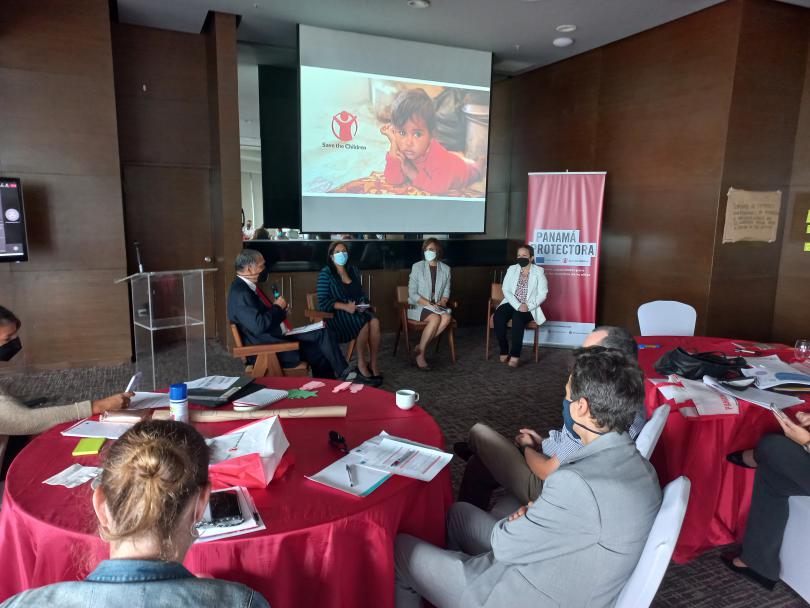SAVE THE CHILDREN PROMOTES CIVIL SOCIETY DIALOGUES FOR THE PROTECTION AND SAFEGUARDING OF CHILDREN IN PANAMA

More than 25 Panamanian civil society organizations gathered at the forum "Dialogues from Civil Society, towards a comprehensive protection system for children in Panama" and the workshop "Safeguarding a commitment of all". This space for meeting and exchange of experiences was organized by Save the Children, with the support of the European Union, within the framework of the Panama Protectora project, an initiative that promotes the protection of children and adolescents in the country, especially those under institutional care.
Save the Children gathered civil society representatives so that their organizations could articulate their efforts to build a Comprehensive Protection System for Children in Panama. Ann Linnarsson, Director of Save the Children's Civil Society Strengthening Program said: "The participation of civil society is fundamental to guarantee the integral protection of children's rights. Moving towards a comprehensive protection system is a major challenge and will only be achievable if we have a strong and inclusive civil society."
Kurt Leiseder, Representative of the European Union insisted on the responsibility we have as a society to defend the rights of children and adolescents. "The actions we take today are defining how societies will be in the future, it all depends on how we treat future generations today. Civil society organizations can give continuity to the efforts and keep child protection as a priority issue on the public and political agenda. We hope that this exchange of experiences will stimulate good practices, in order to move forward with Panama Protectora's objective of strengthening the rights of children and adolescents," he said.
For her part, Esmeralda Arosemena de Troitiño, Commissioner of the Inter-American Commission on Human Rights, said: "Since 1999 we have been behind the proposal of the Integral Protection Law for children and adolescents in Panama. Today we have Law 285 of February 15, 2022, which encourages us to work from the perspective of guaranteeing the comprehensive protection of the rights of children and adolescents, from the importance of socio-cultural transformation regarding the recognition of children's rights and the identification of key issues. What we want is to guarantee through a whole system the rights of girls and boys".
Rosaria Correa, Professor and Director of the Observatory against the sexual exploitation of children and adolescents of the University of Panama, stated that civil society has played a decisive role in the adoption of Law 285 of February 15, 2022. She concluded that cultural changes are being worked on in order to make effective the exercise of the rights of children and adolescents and that the current legislation brings with it a change in the methodology of work in favor of minors. "Co-responsibility implies a shared responsibility in different degrees between different agents of the State, government and civil society. Current legislation makes it necessary for different public and private agents to work together and in a network to achieve comprehensive protection of the rights of minors".

The international experience of Paraguay was a reference in the event with the participation of Marta Benítez, Director of Global Infancia, who spoke about the role of civil society in the construction of the National System for the Promotion and Protection of the Rights of Children and Adolescents in Paraguay. In her speech she emphasized: "The role of civil society, with a rights-based approach, promotes participation, so that the voice of children and adolescents is heard. This means including all children and adolescents, since sometimes we only include those who go to school. Civil society must see how to bring to the table those who are not in school. We must ask ourselves who should be included, for example, the expression of the State must be included and the judiciary must not be left aside. It is essential to include everyone in order to achieve synergies, since the law is only a starting point".
The sociologist Otto Rivera, Executive Secretary of the Institutional Coordinator for the Promotion of Children's Rights in Guatemala (CIRPODENI), speaking about the right of children and adolescents to live in families, emphasized: "If good treatment is necessary, it is because there is abuse; it is known that there is no human development without socio-affective development. This explains why our societies, where violence and disrespect for human rights prevail, where force is used to resolve any difference, the only thing we do every day is to deteriorate the human dimension in our relationships. The good treatment is a current that shows the pedagogy of tenderness. It implies a new political culture, where it is feasible to live from the horizon of dignity for girls and boys.




